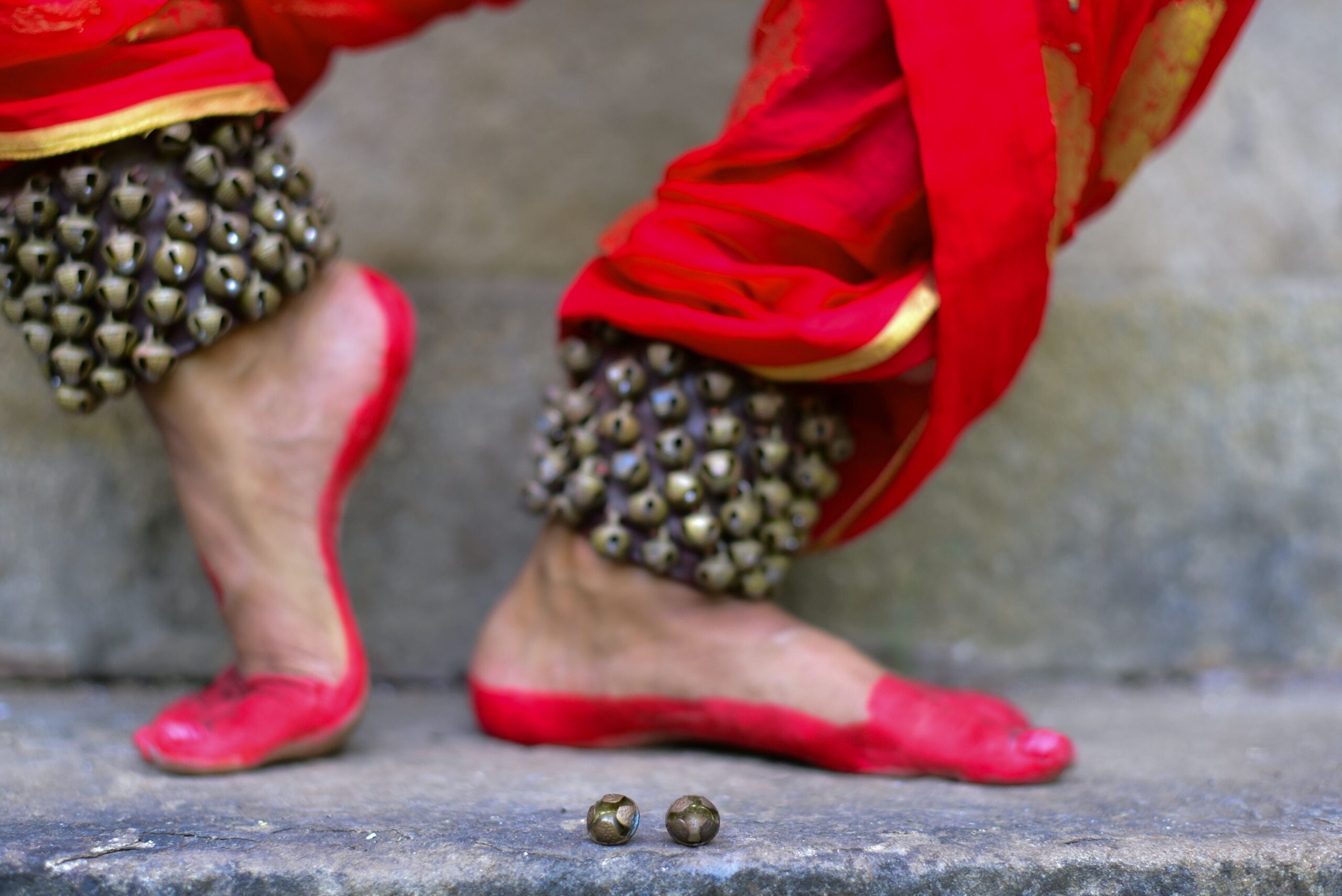“I give you the lyrical grace and beauty of Bharatanatyam,” Lord Nataraja said to Sage Bharatha.
“Teach humankind how to worship me through this divine dance. Venerate my divine anklets. Their vibrations are rooted in my damru. Let the sounds emanating from the anklets lead the dancers to Me. Let those who dedicate their life to dance find a safe haven in my temple.”
My Ajji
She was a passionate dancer. My mother said when Ajji danced, nature joined her. The gurgling stream, the chirping birds, the rustling leaves, the sounds of animals, and the beating of her own heart provided the music.
She needed to hear the jattis, swarams, lyrics, and beats of songs just once for them to become deeply etched in her brain. Her body moved in rhythm with the soundless music in her head.
Many pairs of eyes leered at her through the bushes as she practised daily for hours on end in the little clearing at the edge of the village. But she was immune to them all.
She wanted to dedicate her life to dance. For that, she had to perform the gejje puje, the anklet worship, the initiation into becoming His wife. But her Amma resisted it vehemently.
"No! No gejje puje for you. Run away from this hell. Make your life outside of this temple."
"No, Amma. This temple gives us the opportunity to follow our dancing dreams. It will be different for me."
"You fool! Don't you realise that dance is just a facade? You don't marry Him. You become a puppet in the hands of lusty men."
“I will break free,” my Ajji promised her weeping, helpless mother.
The day of her gejje puje arrived, bright and sunny! She did an elaborate pooja to her new, shiny anklets, offering them to Him first, then to her guru, then to Amma, who turned her face away instead of blessing her.
How can I bless my child to fall into a dirty, horrible trap?
My Ajji tied the gejje to her delicate ankles. She felt the anklet's power seep into her body. She could fight anything to be able to dance. She danced the entire day. It was a beautiful day until night came!
On that horrendous first night, she fought like a tigress, hitting, kicking, and punching the old, balding sahukara with all her might. She thought he was her mentor, the one who supported her dance journey! He had paid the guru dakshina on her behalf! He had merely bought her virginity.
The burden of her mother’s vehement resistance fell heavy on her. His ugly, flabby paunch pushed her down. He forced his way in until she couldn’t fight any more.
She served lecherous men who hid behind the guise of custom and caste, just as her mother did, and her mother before her. When did dance take on this vile form?
Night after night, men visited her. The gejje puje had made her a slave to salacious men! She couldn't break free. She couldn't keep her promise to her mother.
My Amma
Like my Ajji, my Amma loved to dance. Like my great-Ajji, my Ajji tried to dissuade her. But dance was an irresistible lure.
“I will have my gejje puje and prove to you that dance is a way of worshipping Him. My guru has promised to make me a great dancer.”
But her guru failed her just as my Ajji’s guru had failed her. My Amma’s gejje puje was fixed by another old sahukara.
The one spark of light in my mother's life was that she found love. He was the son of a poor farmer in the same village.
Their union was fated to die right from the start. But they thought love would conquer all. They found different excuses to put off the anklet worship ritual; sickness, gynaecological issues, unpreparedness!
When my Amma realised she was pregnant, the poor farmer’s son announced that it was his child. There was mayhem in the village. How dare a girl like her have dreams of getting respect and dignity, of being someone’s wife? The villagers bayed for their blood. The gejje puje was forced upon her.
That night, when the sahukara visited her, she was ready. As he fell on her, she plunged the knife hidden in the folds of her new silk saree into his neck and ran from that hellhole, protecting me from the savage cruelty.
My father stayed back to bear the terrible consequences of forbidden love and murder.
Me
Today, a few decades later, is my gejje puje, a ritual steeped in dignity and respect in the city, the place my mother ran to when she was pregnant with me. The custom has earned back its respect and reverence, thanks to many revolutionaries and fearless fighters who sacrificed their lives and fought tooth and nail against social injustices.
Today, my father is in the audience, his teary eyes twinkling with joy at the sight of me on the stage, replicating my mother’s graceful moves.
Today, I dance without fear, guilt, or shame. My dance is always a prayer, a prayer to the Cosmic Dancer, seeking succour for women who are still caught in the ghastly web of inequality and discrimination.
Often, my dance angrily chastises Him for not doing enough to protect the carriers of His gift. Didn't He use Rudra Tandava to avenge the death of his Beloved? My mother used the same anger to kill her perpetrator! Yes, anger is good!
Today, unlike my Ajji and Amma, I dance for myself, for my art-loving audience, and not for the likes of the greedy, salacious sahukaras. I dance in the hope of His divine promise that the sounds of the anklets will lead me to Him. Dance is my worship as it was always meant to be.
Glossary:
Ajji – grandmother
Damru – A small handheld drum, an instrument associated with Lord Shiva
Amma – mother
Guru dakshina – payment made by students to teachers
Sahukara – landlord or zamindar
Gejje puje – A tradition of anklet veneration and worship that took a vile form to initiate women into prostitution under the devadasi system
Rudra Tandava – A fierce form of dance symbolising death and destruction of evil.
Author’s notes: This story is inspired by a famous Kannada movie Gejje Puje based on a novel of the same name by M K Indira.
Pic credit: Siddhesh Choudhari on Unsplash
[zombify_post]







